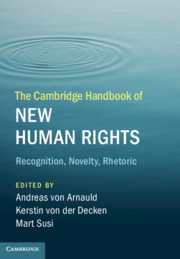Book contents
- The Cambridge Handbook of New Human Rights
- The Cambridge Handbook of New Human Rights
- Copyright page
- Contents
- Figures
- Contributors
- Acknowledgements
- Introduction
- Part I Cross-Cutting Observations
- Part II Public Good Rights
- Part III Status Rights
- Part IV New Technology Rights
- The Right to Internet Access
- The Right to Be Forgotten
- Reproductive Rights
- 24 The Fruits of Someone Else’s Labour
- 25 Birthing New Human Rights
- Genetic Rights
- Part V Autonomy and Integrity Rights
- Part VI Governance Rights
- Index
24 - The Fruits of Someone Else’s Labour
Gestational Surrogacy and Rights in the Twenty-First Century
from Reproductive Rights
Published online by Cambridge University Press: 04 January 2020
- The Cambridge Handbook of New Human Rights
- The Cambridge Handbook of New Human Rights
- Copyright page
- Contents
- Figures
- Contributors
- Acknowledgements
- Introduction
- Part I Cross-Cutting Observations
- Part II Public Good Rights
- Part III Status Rights
- Part IV New Technology Rights
- The Right to Internet Access
- The Right to Be Forgotten
- Reproductive Rights
- 24 The Fruits of Someone Else’s Labour
- 25 Birthing New Human Rights
- Genetic Rights
- Part V Autonomy and Integrity Rights
- Part VI Governance Rights
- Index
Summary
The right to found a family, linked to the right to marry, is part of the bedrock of modern international human rights. Foundational human rights instruments describe the family as the ‘natural and fundamental group unit of society’, and as such, it is ‘entitled to protection by society and the State’. Subsequent international human rights treaties delve into matters of family reproduction ensuring, for example, that women have access to family planning information and services on an equal basis to men so they can ‘decide freely and responsibly on the number, spacing and timing of their children’. Later international political consensus documents herald such reproductive rights as human rights. Yet despite occupying such a formidable place in international human rights doctrine, the topics related to family formation are epically contentious. Marriage equality, sex education, sexual identity/gender expression and abortion have been the trip wires of national and international law and politics, as well as human rights advocacy and normative development. Much the same could be said about recognition of the family ‘in all its diverse forms’. Intergovernmental meetings on topics such as HIV/AIDS, women’s rights, the environment and children have become protracted occasions where defenders of ‘tradition’ are pitted against promoters of ‘modernity’. States line up according to their understanding of the ‘family’ under international human rights – whether it admits of evolving social norms or must defend the status quo.
- Type
- Chapter
- Information
- The Cambridge Handbook of New Human RightsRecognition, Novelty, Rhetoric, pp. 311 - 325Publisher: Cambridge University PressPrint publication year: 2020
- 1
- Cited by

